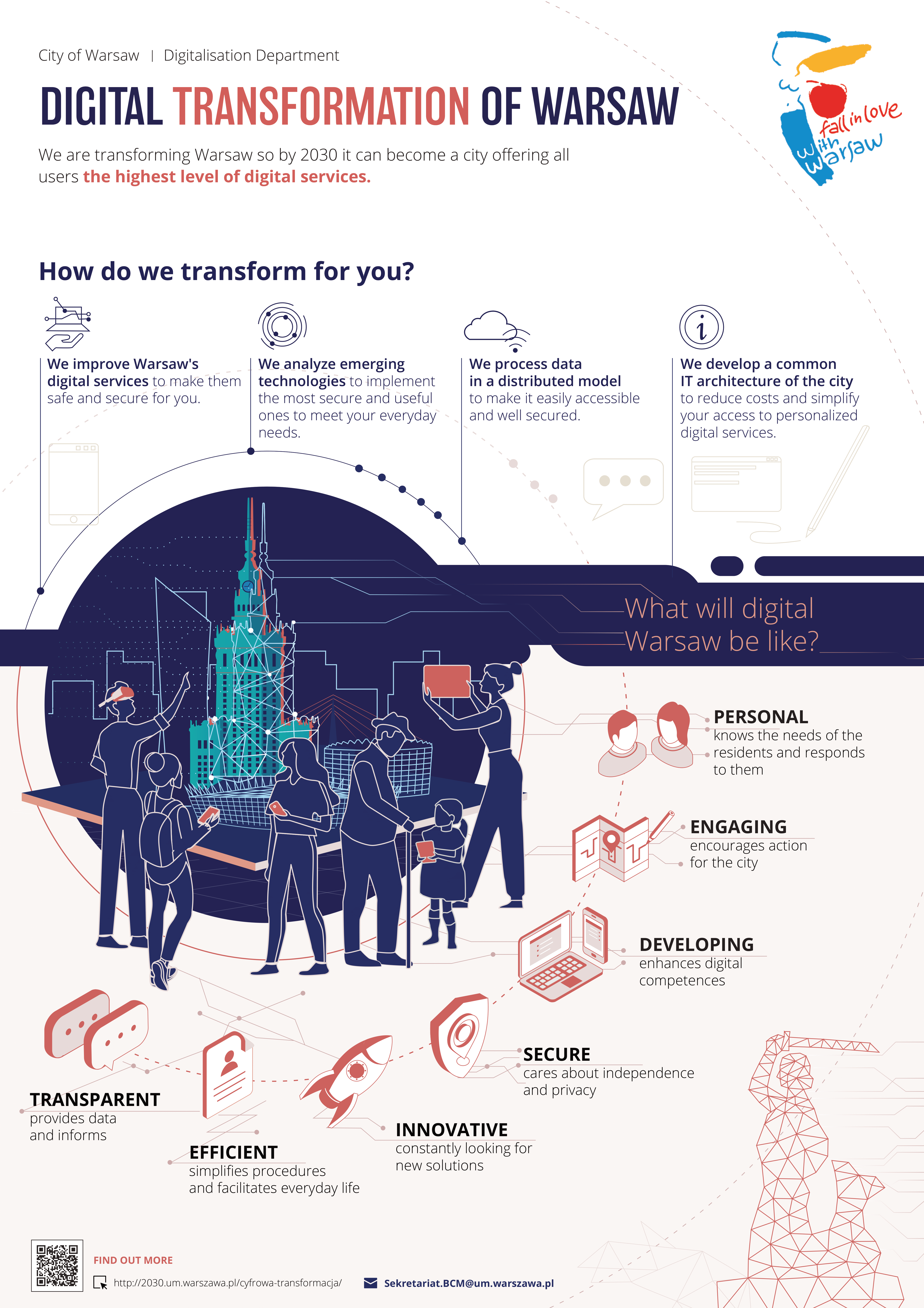Thessaloniki gets ready for its metro launch in November
The underground rapid transit lines have been under construction for almost two decades due to various project delays
 TheMayor.EU logo
TheMayor.EU logo By 2030, the Polish capital should be offering the highest level of digital services
Warsaw has adopted a policy paper for its digital transformation by 2030, the authorities informed on their website on Wednesday. The strategic document defines a clear path to digitalisation that the Polish capital is set to take for the next decade.
The focus is on people and their needs, with special emphasis on privacy, security and sustainable development.
The Digital Transformation Policy for the Capital City Warsaw describes the concept of the capital's development in the field of new technologies and digitization. It indicates the values to which this development is subordinated and the principles of operation of the city's institutions.
The focus is on people and their needs, which can be satisfied more conveniently and economically, with special attention to privacy and security as well as sustainable development of the city, as is explained on the municipal website.
“Warsaw, as the largest local government service provider, entered the path of digital transformation. The current approach to digitization has been written down and declared in an official city document… This puts Warsaw next to such centres as Berlin, London, Vienna, Amsterdam and Helsinki, i.e. cities with high quality of life that implement declared policies in the area of digital development,” said Mayor Rafał Trzaskowski.
The work on the digital transformation of Warsaw had actually begun about two years before the coronavirus pandemic forced local governments to adopt long-awaited technological solutions. The preparation of the 17-pages long document followed a report of over 200 pages.
For the said report, city authorities conducted workshops, individual interviews and online consultations with representatives of non-governmental organizations, universities and private companies. In the process, they have collected and analysed over 450 comments related to the issue in question.
As a result, this year the city will be launching a platform where it will gradually make available digital services, such as applications, taxes, tickets for public transport or cultural institutions.
On top of this, the policy paper suggests further opening of the Warsaw data sets, which the city has been doing since 2015. Currently, it has about 100 collections, mainly relating to transport.
Furthermore, this year, Warsaw will launch the city's Internet of Things (IoT) platform. IoT refers to a system of items and devices that can process or exchange data via the Internet (e.g. street lamps informing about a damaged light; free parking spaces).
The IoT platform will show hundreds of measuring devices located in the city and will allow the reading of current data, e.g. from air quality sensors, noise sensors, bicycle stations, parking lots. The analysed data (so-called big data) makes it possible to better manage the city.
Finally, the new urban digital policy promises an analytical approach to new technologies - 5G, artificial intelligence (AI) or blockchain, and those that are yet to emerge. It will therefore implement only proven and safe technologies and will use them for the purpose of facilitating the daily life of Warsovians.
The Digital transformation policy is part of the wider strategic vision for urban development called #Warszawa2030. You may find more information about both of these in English on this link.
 Outline of Warsaw’s Digital Policy. Image by City of Warsaw
Outline of Warsaw’s Digital Policy. Image by City of Warsaw
TheMayor.EU stands against fake news and disinformation. If you encounter such texts and materials online, contact us at info@themayor.eu

The underground rapid transit lines have been under construction for almost two decades due to various project delays

Now you can get your wine in Talence by paying directly in Bitcoin

That’s because the state has to spend money on updating the railway infrastructure rather than subsidizing the cost of the popular pass

Rethinking renewable energy sources for the urban landscape

The examples, compiled by Beyond Fossil Fuels, can inform and inspire communities and entrepreneurs that still feel trepidation at the prospect of energy transition

Now you can get your wine in Talence by paying directly in Bitcoin

The 10th European Conference on Sustainable Cities and Towns (ESCT) sets the stage for stronger cooperation between the EU, national and local level to fast track Europe's transition to climate neutrality.

At least, that’s the promise made by the mayor of Paris, Anne Hidalgo

The underground rapid transit lines have been under construction for almost two decades due to various project delays

At least, that’s the promise made by the mayor of Paris, Anne Hidalgo

Hostal de Pinós is located in the geographical centre of the autonomous region

Despite its church-y name, the district has long been known as the hangout spot for the artsy crowds

Urban dwellers across the EU are having a say in making their surroundings friendlier to people and the environment.

Forests in the EU can help green the European construction industry and bolster a continent-wide push for architectural improvements.

Apply by 10 November and do your part for the transformation of European public spaces

An interview with the Mayor of a Polish city that seeks to reinvent itself

An interview with the newly elected ICLEI President and Mayor of Malmö

A conversation with the Mayor of Lisbon about the spirit and dimensions of innovation present in the Portuguese capital














